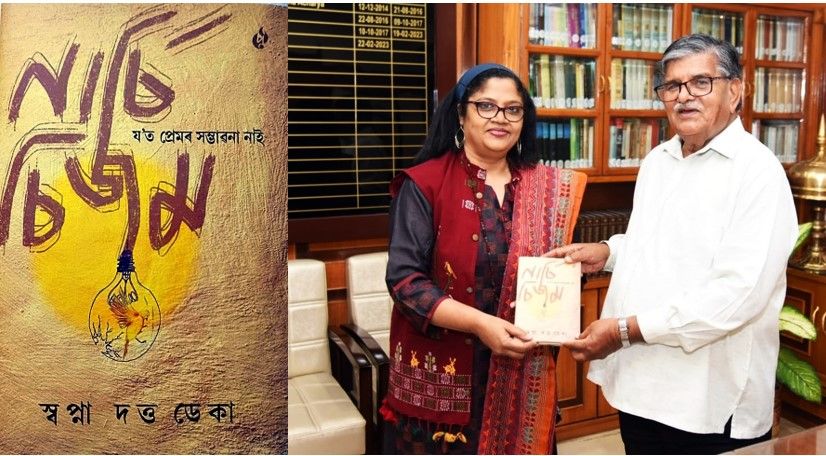IAS officer Swapna Dutta Deka recently unveiled her latest book, delving into the intriguing topic of Narcissism. Inspired by a quote from James Woods that identified narcissism as the silent killer of great individuals, especially those of notable achievements, Swapna Dutta Deka, having encountered numerous people in her administrative role, found herself drawn to the subject. This interest led her on a journey of reading, analysis, and eventually writing, resulting in her becoming the first author to tackle this subject in Assamese. She presented the inaugural copy of her book to the Governor of Assam, Sri Gulab Chand Kataria.
In a recent conversation with Bhavesh Harinkhede, Swapna Dutta Deka shared insights into her writing journey and the essence of her book.
Q1: When did you start writing?
Ans: I began my writing journey in the late ’80s and ’90s with regular contributions to “Dainik Janambhumi.” I also wrote for publications such as “Prantik,” “The Assam Tribune,” “The Sentinel,” “Amar Asom,” “Niyomia Barta,” and “Asom Aditya.”
Q2: Beyond journal and newspaper columns, tell me about your published books.
Ans: My published works include translations like “Purnagrash Suryagrohan: Amar Sokolu Prosnor Uttor” and “Grohon Somporkio Andhabiswash Aru Kahini.” I’ve also written a collection of poems titled “Prem Alakananda” and various short stories, plays, and articles in books such as “Rajbodhu aru Anyanya” and “Sapon Sohoror Kisu Kotha.” My latest book is “Narcissism: Jot Premor Sombhawana Nai,” which explores a unique subject. Notably, my poem “Moi” was adapted into the film “Bohubritta” (Circles) by Utpal Datta, earning recognition at national and international film festivals.
Q3: Share details about your academic background and achievements.
Ans: I attended Govt Girls’ Higher Secondary School in Dibrugarh, securing the top position in the 12th standard at MDK Girls’ College under Dibrugarh University. I earned a First Class in MA in Economics.
Q4: Besides studies and writing, do you engage in any other activities? Ans: I am actively involved in cultural activities, participating in radio and stage plays as a drama artist for AIR. My recitations and songs are available on YouTube.
Q5: As a senior IAS officer, what inspired you to write a book on Narcissism?
Ans: Life is full of different kinds of people, right? Sometimes, the way they act or think can be a bit confusing. As someone who’s worked in important roles, like being an IAS officer, I’ve met a lot of people in various situations. Understanding why people do certain things became really interesting to me. While figuring this out, I came across something called Narcissism. It’s a way to understand why some people act overly self-centered or show off a lot. I didn’t just want to know this for academic reasons; I wanted to help others dealing with folks like that.
Narcissism helps to unravel the mystery behind certain behaviors. I believe that knowing about it can be useful for people facing challenges in their relationships or workplaces. My goal is to make this topic easier to understand so that it can be a helpful guide for everyone. It’s not just about me learning; it’s about sharing what I’ve learned so others can navigate tricky social situations more easily.
Q6: Could you provide a brief overview of the book’s contents?
Ans: The book covers Narcissism Dynamics, various types of Narcissism, a glossary of related terms, insights into why some individuals become narcissists, guidance on dealing with narcissistic individuals, exploration of Narcissism in films, the relationship between Creativity and Narcissism, and an examination of Narcissism in Social Media.
Q7: Share a bit about your childhood and the atmosphere in your home.
Ans: Growing up in Dibrugarh, our home was filled with books, influenced by my grandfather’s writing and my uncle’s journalism. My mother encouraged reading, writing, and cultural activities. My sister, Ratna Dutta, is also a serious reader and writer, contributing to a literary environment.
Q8: I wish success for your book “Narcissism” as it seems it will benefit many people.
Ans: Thank you. I share the same hope and aspiration for the book’s positive impact.

